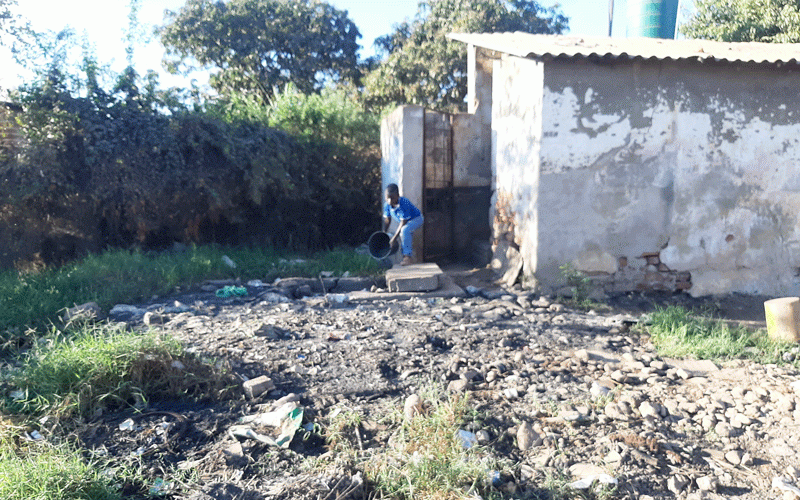
Residents in Kadoma’s oldest suburb — Rimuka — are sitting on a health time bomb.
Overcrowding, poor water reticulation, obsolete sewer systems, uncollected refuse and old inhabitable homes are the order of the day in this high-density suburb, particularly in the areas called Single Quarters and General Barracks (SQ/ GB).
The houses in the area were built in the 1950s to accommodate male employees who were working at the now defunct David Whitehead textiles company.
Residents in the area have raised alarm over a possible cholera outbreak in the wake of the disease having wreaked havoc in some parts of the country.
According to the Health ministry, the country had recorded 3 368 suspected cholera cases and 61 suspected deaths as of July 21 from 38 districts.
A pungent smell emanates from heaps of garbage on the roadsides which is a mixture of empty bottles, plastics, stale sadza and human waste, among others.
Flies buzz all over the place, evidently having a busy day from one puddle of indoor sewage to another.
Stagnant water, which seems to have collected for days, exports its own smell making it a breeding room for flies and mosquitoes.
- Chitungwiza sewer infrastructure collapses
- Chitungwiza sewer infrastructure collapses
- LSU runs dry, students resort to open defecation
- Malawi cholera death toll crosses 1,300: health official
Keep Reading
More than 200 families have shelter in this high-density suburb.
“My sister, this is our everyday life and we are used to it now,” said Josephat Marisa, who has lived in the SQ area for 35 years.
“Tuberculosis and diarrhoea are rife in the suburbs because of the degenerate living conditions.
“This area, which we are in, is called Single Quarters which means it is meant for one person not hundreds of people who live here.”
This publication established that over 300 families were sharing a handful of communal toilets and bathrooms, which are now obsolete and failing to cope with the growing population.
The absence of running and potable water makes the situation worse and Marisa blames all this on the local authority.
“We do not see the point of the media coming here and taking pictures to publish the stories because nothing will change,” Marisa said.
“We are tired of those election candidates who want us to vote for them lying to us that they want to renovate the area and build toilets for us.
“You see that toilet over there was renovated by Fani Phiri (former Kadoma Central MP) when he was soliciting for votes.
“We are tired, they promise paradise on earth, but after voting for them, they disappear.”
Marisa said they find themselves in that situation because they don’t have money to buy their own residential stands.
“We do not have money to buy stands since we rely on vending to make ends meet,” he said.
“Each block has more than 32 rooms and there are at least seven people in every room.
“So if you multiply the numbers you will see that we are overcrowded here.”
A woman only identified as Mai Moyo said their living conditions were appalling and there was no privacy.
“We are six people in our family living in one room,” she said.
“There is no privacy at all as our children see everything that we do in between the sheets.
“Despite us dividing the room using curtains, there is no privacy at all.”
She said the cultural fabric had been eroded as a result of the living conditions.
“Cases of drug and substance abuse are very high while child marriages are the order of the day,” Mai Moyo said.
“There is nothing that we can do as long as we live in such conditions.
“We don’t have money to find our own decent homes.
“We survive by selling fruits and vegetables at the market that you see over there.”
Tawanda Maketo, popularly known as DJ Tawaz, who was born and bred in the area said things were getting worse with each passing day.
“Things have become more difficult now, back then council used to service our houses, but not anymore,” he said.
“We pay council rates, but they are not giving back the service delivery we need here.”
It was established that tenants were paying US$30 as monthly rentals per room.
Maketo attributed the squalid living conditions to lack of accommodation and exorbitant rental fees for decent homes.
In its 2018 election manifesto, Zanu PF announced an ambitious project to construct 1,5 million housing units by 2023.
According to the latest Zimbabwe National Statistics Agency data, nearly half of the urban population, about 5,7 million people, were living in rented accommodation, with a large number living in squalid conditions.
The housing backlog in urban areas is two million, according to National Housing and Social Amenities minister Daniel Garwe.
However, Kadoma mayor Tendai Kokera said the local authority was working hard to address the issue of accommodation in the city while at the same time trying to improve the living conditions of Rimuka residents.
“We have started working on the sewer first then we move on to other things so that we do not mix them up,” Kokera said.
“What l can say is something is going on, on the ground. l will give you an update after l get in touch with the engineer.”
In 2015, Environment Africa judged Kadoma the dirtiest city in Zimbabwe following an independent survey of the country’s major towns.
Between 2008 and 2010 Kadoma experienced severe cholera outbreaks that affected 6 393 and 123 people respectively.
The mainly affected areas were the SQ and GB.










